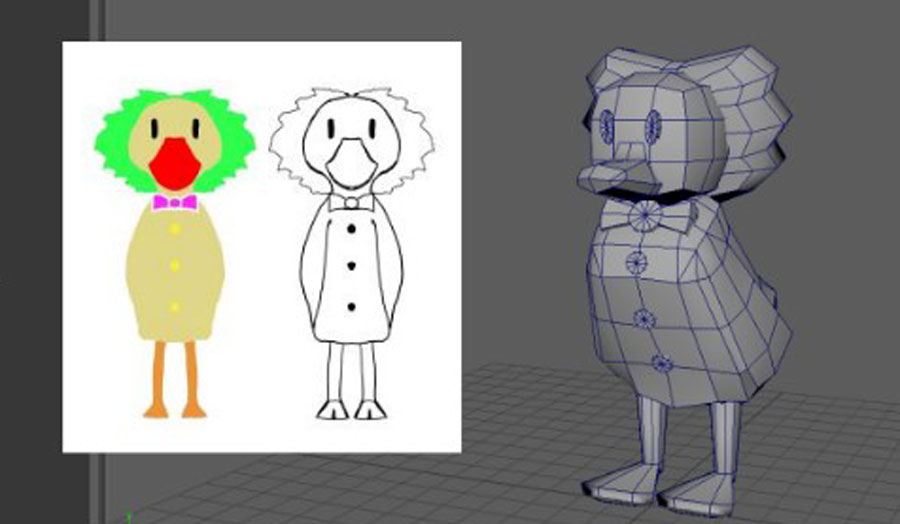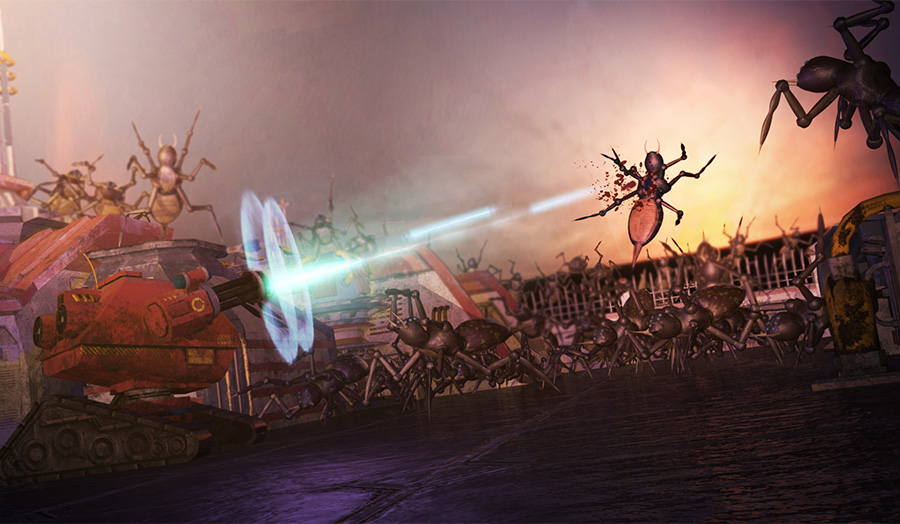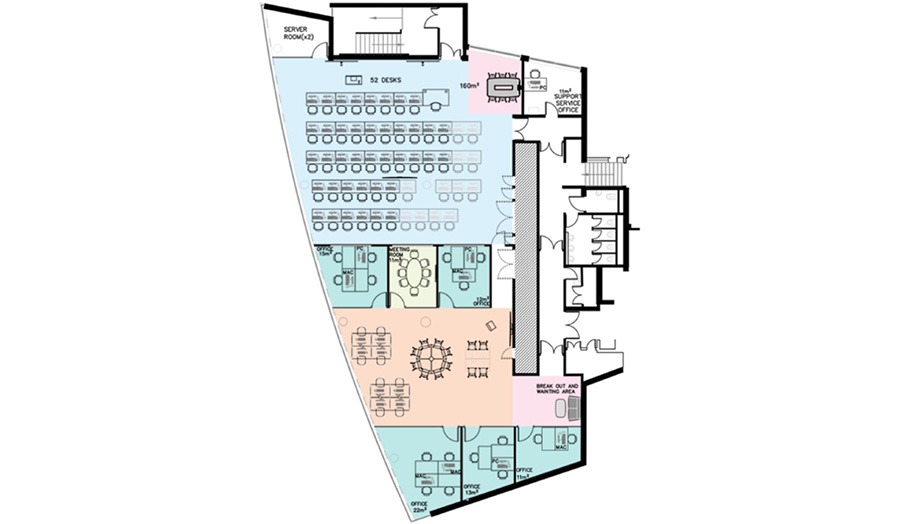Apply for this course
Please select when you would like to start:
If you're a UK applicant wanting to study full-time starting in September, you must apply via UCAS unless otherwise specified. If you're an international applicant wanting to study full-time, you can choose to apply via UCAS or directly to the University.
If you're applying for part-time study, you should apply directly to the University. If you require a Student visa, please be aware that you will not be able to study as a part-time student at undergraduate level.
Applying for September 2024
If you're a UK student or an EU student with settled or pre-settled status applying for September 2024, you can simply call our hotline on 0800 032 4441 or complete our fast-track online application form.
Why study this course?
Our Games Programming BSc degree will enable you to develop the specialist knowledge and key skills needed to join this thriving industry. You’ll be joining a supportive and friendly community of highly motivated games students who work hard to achieve their goals.
Gain expertise in lots of aspects of games programming
You'll develop specialist skills in physical computing, virtual reality and artificial intelligence while becoming proficient in a range of relevant programming and scripting languages
Show off your work
We actively encourage you to engage in public competitions and gaming events such as Game Jams and we hold an annual Summer Show where students at all levels have the opportunity to showcase their work to a wider professional audience
Gain a solid grounding in game design before developing your skills further
You'll start by building a strong base in C++ programming, with mathematics and physics for game development, as well as gaining skills in console hardware architecture and game design
Course modules
The modules listed below are for the academic year 2024/25 and represent the course modules at this time. Modules and module details (including, but not limited to, location and time) are subject to change over time.
Year 1 modules
Year 2 modules
Year 3 modules
Computer Gaming Hardware Architectures
(core, 30 credits)The module introduces students to the basics of Information Technology; past, current and future trend in computer and gaming systems. The detailed design of a small scale Gaming System is presented where students have the opportunity to directly program the hardware. Students will learn how a knowledge of assembly language and different compilers should inform the development of higher level programming languages, such as C++, in order to produce optimal code. Students will develop expertise and transferable skills in writing for a particular handheld gaming platform.
The module aims are:
To introduce students to the fundamental concepts of Information Technology and basic networking,
To provide a working technical knowledge of modern computer and gaming systems and their respective components,
Build awareness of assembly and compilers so as to inform the development of optimal programming code
Gain skills in interfacing assembly with a high level language for a console emulator
Gain skills in interfacing assembly with a high level language on a PC.
Game Design and Development
(core, 30 credits)This module provides an introduction to the topic of computer games from a variety of perspectives. It is designed to help students understand and appreciate many of the different technical and psychological approaches games designers and developers use in their work.
It will also facilitate the development of the skills needed when developing gaming applications using contemporary scripting languages.
Students will also start to develop a rolling CV and web-based portfolio.
AIMS
- provide an understanding of the history of computer game design and an appreciation of complexity of the topic, including the technology required for developing complex interactive systems
- develop creative and lateral thinking in response to a range of stimuli with particular reference to game design
- develop communication and study skills
- implement scripting and programming capabilities in the area of casual games
- equip students for employment in the games industry, web and digital media industries.
Game Programming
(core, 30 credits)This module is essentially an introduction to programming for computer games, intended to build students' confidence and interest in technical aspects of games development. Students will develop an understanding of the skills required to build games for different platforms, including console, web, computer and mobile.
• introduce students to C++ and other games programming languages
• develop skills in graphics programming and simple maths and physics in code
• develop the necessary communication skills required for working in teams in the games and digital media industries
• enable students to design and produce simple 2D games to a high standard
Logic and Mathematical Techniques
This module currently runs:all year (September start) - Thursday morning
(core, 30 credits)
This module develops a range of mathematical techniques including set theory, logic, relations and functions, algebra, differentiation and integration. The techniques provide the foundation for further study of Mathematics, Computer Science and Computer Games Programming and Computer Systems Engineering.
Read full detailsAdvanced C++ for Games
This module currently runs:all year (September start) - Wednesday morning
(core, 30 credits)
The module provides further development of programming skills at application and system level across a range of platforms. Some of the problems of system independence will be addressed along with inclusion of library applications in the different environments.
Students cover the intermediate part of C++, and consider how to optimise code for different platforms. The module makes use of a pre-built low-level game engine that helps students build a 2D game.
Students will be introduced to more advanced features of C++ such as operator overloading, templates, the STL, file handling and game/system design principles
The module aims are:
• to make students aware of the features in a programming language which makes it suitable for use in systems programming;
• to enable students to compare programming languages thus reinforcing transferable programming skills;
• to enable students to apply problem solving techniques in a specialised application area.
• provide overview of the main methods/techniques for model design, simulation, analysis;
• develop practical skills by practical coursework implementation;
• build awareness of coding practice for different platforms with respect to optimisation.
Augmented Toy Development
This module currently runs:all year (September start) - Monday morning
(core, 30 credits)
Students will be working individually and in teams to research and develop a prototype product within the area of Augmented/Virtual Reality.
Aims
• gain awareness of new technological developments and their impact on toys and games
• develop skills in concept design and blue-printing
• increase knowledge and skills in the area of physical computing
• develop written and verbal communication skills
Game Engine Development
This module currently runs:all year (September start) - Monday afternoon
(core, 30 credits)
This module builds on the knowledge and skills acquired in Level 4, introducing students to 3D graphics programming, using managed code. During the module, students will work in teams to develop a 3D game and consider some of the economic and marketing issues associated with production.
The module aims to:
· provide an understanding of the mathematics associated with 3D space
· introduce 3D graphics and audio pipelines
· foster students' programming and asset production skills
· develop creative skills by producing a 3D game
· develop students' profiles of personal/professional development
Graphics and Shader Programming
This module currently runs:all year (September start) - Tuesday afternoon
(core, 30 credits)
The module is designed to broaden student understanding and develop practical skills up to the advanced level in programming applications for computer graphics, imaging and the associated technology with the focus on game programming. The theoretical work is designed to give a broad-based understanding of the graphics devices, graphics/images and shaders as well as graphics API (Applications Programming Interface) used in a variety of applications (including game development industry). The practical work is designed for programming of computer games (prototypes) or computer graphics and images as game elements for display on relevant devices.
Students will gain an overview of the physical processes of graphics/image enhancement and processing, as well as an understanding of the software framework necessary to produce graphics/images and shaders including for mobile devices.
Prior knowledge and Skills: This module requires a successful completion of Level 4, i.e. relevant knowledge and practical skills of the programming (preferably in C/C++, and in case of C# or Java student may face additional challenge to (re-)learn a new programming language).
AIMS
The main aim of the module is to provide an advanced level of knowledge and understanding of the entire programming workflow and relevant API for rendering computer graphics, image processing and visualisation.
This module aims to:
- enable students to understand the 2D/3D graphics API, the processes of computer graphics programming, storage, and visualisation of graphics/images on various display devices;
- develop communication and practical skills with particular reference to graphics programming and image processing as well as their visualisation;
- design and implement mathematical concepts and programming structures as well as algorithms in the area of graphics and image processing;
- equip students for employment in the variety of industries relying on computer graphics and image processing (computer games, Virtual Reality, simulations, aerospace or automotive industry, engineering, CAD/CAM and machine/robotic vision, medical applications, geo-survey, security and etc applications).
The module also aims to help students to continue development of a personal portfolio by adding a computer graphics application or game (prototype) that demonstrates understanding of the key principles and practical skills to use industry standard API for 2D/3D computer graphics programming and image processing in a variety of applications.
Read full detailsArtificial Intelligence
This module currently runs:autumn semester - Thursday afternoon
(core, 15 credits)
This module provides an introduction to the field of Artificial Intelligence, from its historical context to its current state. Students will research an aspect of AI and work in teams to design an intelligent system and develop a simple prototype.
The module aims to
• to build students’ knowledge and understanding of AI and its range of applications;
• to enable students to use their skills and knowledge to design a contemporary intelligent system;
• to develop students’ critical faculties with respect to the ethics and the issues surrounding AI;
• to build skills in software engineering and prototype development
Artificial Intelligence for Games
This module currently runs:spring semester - Thursday afternoon
(core, 15 credits)
This module looks at the use of AI in the development of computer games, digital media and other products from a variety of perspectives. Students will undertake a small piece of research in this field and present their findings. This work will underpin a prototype, built using industry-standard tools and including a system model representation and a description of the final product.
This module is designed to further develop programming and game design and development skills. The module aims to:
· develop students' awareness of artificial intelligence and its current and potential
applications in the field of computer games, digital media and product design
- enable students to solve problems in designing and building complex game
artefacts;
· implement the production of complex game systems;
· develop communication skills with particular reference to artificial intelligence;
- develop research and presentation skills;
· equip students for employment in the games industry
Creative Technology Project
This module currently runs:all year (September start) - Wednesday afternoon
(core, 30 credits)
The Creative Technology Project module provides final year students with an opportunity to carry out an individual extended practical research project in an area of particular interest to them.
Students use this module to develop their skills in specific techniques and processes, and to extend knowledge and skills delivered elsewhere in the course curricula. The module aims to allow students to produce highly sophisticated portfolio pieces which they would be able to present to potential employers upon graduation.
Read full detailsNetworking for Games
This module currently runs:autumn semester - Monday morning
(core, 15 credits)
This course allows students to build multiplayer games and learn what networking is all about. They will learn all about the networking theory and apply that to the server-side and client-side games code they will write.
Building Server/client code and gameplay
Learning about networking theory
Learning what makes a multiplayer game
There will be 2x course works to be completed.
CW1 – A basic networked chat application
CW2 – A full 2D or 3D multiplayer game
Prototype Development
This module currently runs:all year (September start) - Tuesday afternoon
(core, 30 credits)
This module is designed to give students the responsibility for working together as a large team, in order to design and build a 3D console game. Students will work in smaller sub-teams focusing on design or programming techniques or asset production.
The module provides students with the opportunity to take masterclasses in a variety of disciplines related to their chosen sphere of expertise, closely supervised by specialists from relevant industries.
Students will be expected to develop professional quality work to a specialist brief.
This module aims to:
- enable students to understand workflow models, styles of project management and the necessity of good communication skills in a team-based work environment
- implement art, design and/or programming capabilities in the area of computer games and digital media
- develop communication skills with particular reference to computer games and digital media
- equip students for employment in the area of computer games and digital media.
Research Related Learning
This module currently runs:spring semester - Wednesday afternoon
(alternative core, 15 credits)
This module gives students the opportunity to work with research-active staff on a project that deploys their existing skills. The supervisor will be working on a project that requires a contribution of computing, media, audio or 3D work. The student will develop the practical aspect (programming or designing or creating assets) in conjunction with the supervisor and be involved with the deployment and testing of the resource.
Students will be expected to contribute to the writing of any subsequent research papers.
Aims
• undertake some work on a research-related project;
• become more self-aware through reflection on the development of their abilities and attributes;
• enhance subject-specific knowledge, skills and abilities;
• explore research options available to them on graduation;
• enhance professional and personal development.
Work Related Learning for Games and Animation
This module currently runs:spring semester - Wednesday afternoon
(alternative core, 15 credits)
The module enables students to undertake an appropriate short period of professional activity, related to their course at level 6, with a business or community organisation and to gain credit for their achievements. The activity can be a professional training, a volunteering activity, employment activity, an activity within the School of Computing and Digital Media, a placement or business start-up activity.
It is expected student should work for 150 hours which should be recorded clearly in the portfolio. The 150 hours can be completed in 25 working days in a FT mode, or spread over a semester in a PT mode.
Students should register with the module leader to be briefed on the module, undergo induction and Work Based Learning planning and to have the Work Based Learning approved, before they take up the opportunity. It is essential that students are made aware that both the “Work Based Learning agreement” and relevant “health and safety checklist” where applicable need to be approved before starting the learning activity.
The module aims to provide students with the opportunity to:
• gain a useful experience of the working environment and the career opportunities available on graduation.
• undertake a work-based project appropriate to their academic level.
• enhance and extend their learning experience by applying and building on their academic skills and abilities by tackling real life problems in the workplace.
• enhance professional and personal development.










